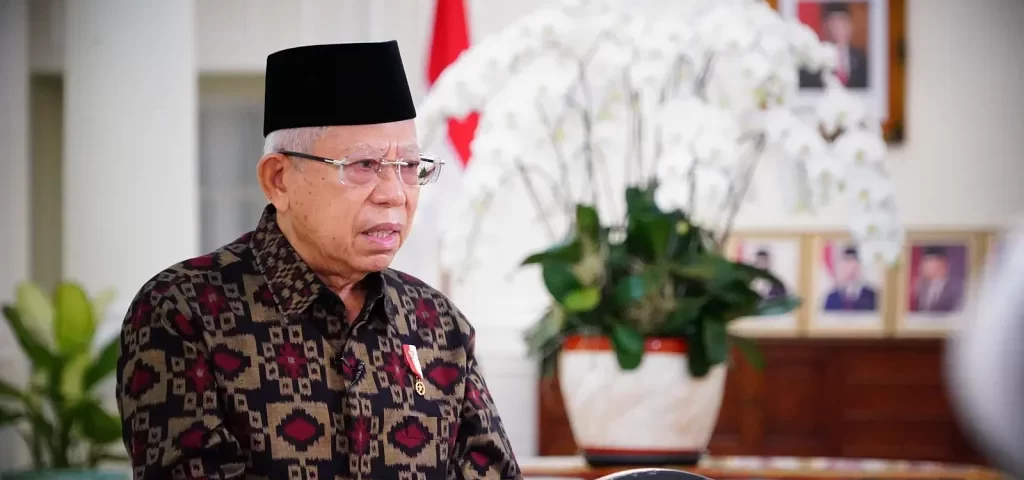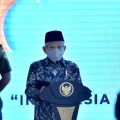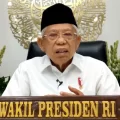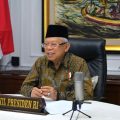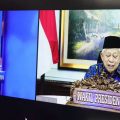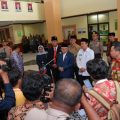Jakarta, wapresri.go.id – The government strives to make Indonesia the world’s halal center in 2024. This policy needs to be integrated into regional development agendas, one of which is in the Special Region of Yogyakarta (DIY). Moreover, this region has considerable potential in culinary, batik fashion, handicrafts, and other creative industry products.
According to data from the DIY Cooperatives and Small and Medium Enterprises (UKM) Office, more than 300 thousand SMEs are growing in this area.
However, of this figure, only about 0.1 percent of micro, small and medium enterprises (MSMEs) are halal-certified. Therefore, more strong encouragement is needed from various stakeholders to optimize the potential of the existing halal industry, as did the DIY Sharia Economic Community (MES) at the Jogja Halal Festival (JHF) this time.
“I believe the halal industry sector in the Yogyakarta area will soar rapidly with the encouragement and support of multi-stakeholders, including MES DIY. This presented activities such as JHF to provide a halal ecosystem that is friendly to MSMEs,” said Vice President K.H. Ma’ruf Amin when he opened the 2nd JHF online, which took place in the Jogja Expo Center area, Bantul Regency, Thursday (11/03/2022).
Furthermore, the Vice President explained four strategies that DIY needs to develop so that the transformation of the Islamic economy in this region will have more impact.
First, said the Vice President, MES needs to encourage collaboration to bridge large businesses and SMEs, including facilitating more SMEs in the DIY region that can export their products to the global market.
“MES is expected to be a friendly home for all Islamic economic and financial players,” he hoped.
Second, the Vice President stressed synergy is needed in providing access to sharia financial services that are easily accessible to business actors in the halal industry sector.
“The Islamic finance sector is urgently needed to support the financing of the halal industry sector,” he said.
Third, continued the Vice President, it is necessary to activate the mobilization of sharia social funds (zakat, infaq, alms, and endowments) as an essential element in the transformation of the sharia economy.
“I encourage the national cash waqf movement to be continued into a cash waqf movement in each region,” said the Vice President.
“People’s literacy regarding cash waqf needs to be improved because the development of productive waqf will be very beneficial in efforts to distribute people’s welfare,” he added.
Fourth, the Vice President advised DIY to immediately form a Regional Sharia Economic and Financial Committee (KDEKS). According to him, KDEKS is an extension of the National Sharia Economic and Financial Committee (KNEKS) to further explore and empower the potential of the Islamic economy in the regions.
“This step will simultaneously encourage the region to become a pocket of growth and spearhead the distribution of people’s welfare,” explained the Vice President.
As a form of concrete steps to move Indonesia’s transformation towards the world’s halal center, the Vice President welcomed the implementation of the 2nd JHF, which is also projected as preparation for the performance of the 3rd JHF at the international level in 2023.
“Make this forum a means of strengthening networking and collaboration, as well as public literacy about Islamic economics and finance,” he pleaded.
Previously, the Minister of Cooperatives and Small and Medium Enterprises (KUKM) Teten Masduki said the Ministry’s strategy in developing the global halal industry focused on halal food by increasing the competitiveness of MSME products through the ownership of business permits and product certification.
Halal travel through developing resource management capacity, human resources, Muslim fashion as an expansion of domestic and foreign market access, and Islamic finance through accelerated financing have also become their target.
In line with the Vice President, Teten also appreciated JHF as one of the steps to make Indonesia the world’s halal center.
“I am optimistic that this halal literacy activity can also boost interest and awareness of business actors in having halal-certified products. And, if the ease of obtaining halal certification supports this, we are optimistic that we can become the world’s halal center,” said Teten convincingly.
On the same occasion, DIY MES Chairman Heroe Poerwadi expected JHF to become a strategic forum for consolidating supply chain links to the halal industry to face the challenges of the global recession and economic slowdown in the coming year.
“In this 2nd JHF, our hope is not only that we carry out promotions, but the most important thing is to be able to collaborate so that the supply chain in the halal industry, we can build together,” hoped Heroe.
For information, the 2nd JHF entitled “Sharia Economic Transformation Towards Indonesia as a World Halal Center” is the DIY MES orchestration with large organizations, such as the Yogyakarta Halal Club (HCY), the Indonesian Muslim Merchants Association (ISMI) DIY, the Halal Tourism Association. Indonesia (PPHI), and the Indonesian Islamic Health Efforts Council (MUKISI).
The activity was held on 3-6 November 2022 with a series of exhibitions of products and services for the halal industry, national seminars, workshops, and business talks, various children’s competitions, education on halal products, awarding Halal Figures, grand Sermon and charity concerts, as well as an international networking and business matching Islamic Healthcare Conference and Expo (IHEX).
Presented on occasion were Expert Staff to the Governor of DIY for Social, Cultural and Community Affairs Etty Kumolowati; the ranks of the Ministry of KUKM, MES DIY, and the DIY Provincial Government; as well as halal industry players in DIY and its surroundings from the culinary, fashion, finance, banking, to health sectors.
Meanwhile, the Vice President was accompanied by the Head of the Vice President Secretariat Ahmad Erani Yustika, Deputy for Policy Support for Economic Development and Increased Competitiveness Guntur Iman Nefianto, Deputy for Policy Support for Human Development and Equitable Development Suprayoga Hadi, and Special Staff for the Vice President for Communication and Information Masduki Baidlowi. (SM/LHS-BPMI, Setwapres)

